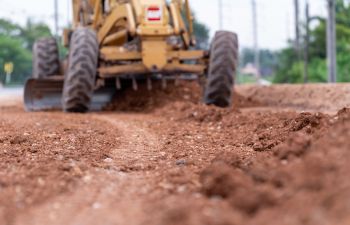Is Dynamic Cone Penetration (DCP) Testing Necessary?

Mixed soil’s compressibility cannot be judged by looks alone. For example, the base may appear well-compacted, but could actually contain high amounts of sand or other non-cohesive substances. As such, it requires soil stabilization.
What is Soil Stabilization?
Soil stabilization is the modification (physical and chemical) of soil to improve its physical qualities. It addresses compressive strength, water permeability and erosion. In addition, it can improve the R-value of a surface above the soil.
To do this, the ground needs to be tested first. The Dynamic Cone Penetrometer (DCP) test is one of the most incredible soil testing and stabilization tools.
What is DCP Testing?
DCP testing measures site soil strength and can monitor subgrade soils and granular layers in pavement sections. Advance Concrete Lifting and Leveling specialists use it to evaluate the best solutions for our customers’ sites, especially where soft soils are involved.
DCP testing is done on-site and involves a specialized cone tip measuring density and sheer strength as it is pushed through the ground. Sheer strength determines load-bearing capacity and slope stability.
The DCP is an easy-to-carry tool consisting of a standard weight hammer, a standard diameter steel rod with a hardened conical tip and a weighted hammer used to drive the tip into the ground. Each hammer blow’s penetration is measured vertically in inches or millimeters. This value is associated with soil strength metrics like California Bearing Ratio (CBR).
Why is DCP Testing Necessary?
Assessing subsurface soil compaction is vital for designing and validating compaction, especially for transient or cycle loads. For example, on roads, the passing traffic’s cycling loads will compact the soil beneath the road if it has not been packed sufficiently beforehand. Thus, DCP testing can prevent surface failures such as potholes, wide cracks and displaced pavement.
Why is Soil Stabilization Necessary?
No matter how effectively compacted a concrete project’s soil is, the project could fail if it lacks bonding properties. Non-cohesive soils move apart under aggregates and concrete, causing unlevel surfaces, cracking, voids, erosion and crumbling.
Benefits of Soil Stabilization and DCP
- DCP saves money up front and prevents costly fixes. For example, instead of removing or bringing in significant amounts of soil, we can simply alter the existing soil to improve performance using stabilizing agents or chemical reactors.
- To get a complete picture of the soil, you may need to look beyond the area where you will build foundations. DCP’s portability makes it an easy tool to relocate.
- You can quickly gather data from various locations, enabling you to figure out how soil conditions change around the site.
- DCP provides readings of soil strength from varying depths. Soil strength changes with depth, and this information might be crucial in developing the best solution for subgrade soils unsuited for construction.
- DCP delivers precise field and construction soil conditions.
Trust Advance Concrete Lifting and Leveling with Your Soil Compacting Needs
Contact Advance Concrete Lifting and Leveling for more information on assessing soil conditions and stabilizing problematic soils. Our DCP testing and soil analysis will produce ideal conditions for any concrete project.
Posted on Behalf of Advance Concrete Lifting and Leveling

















